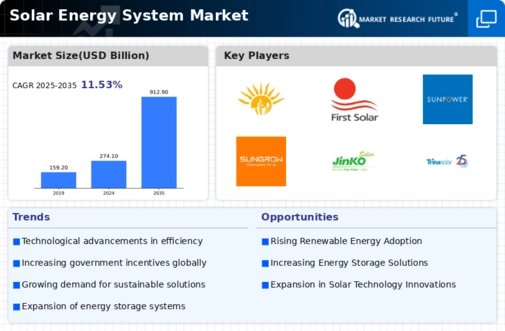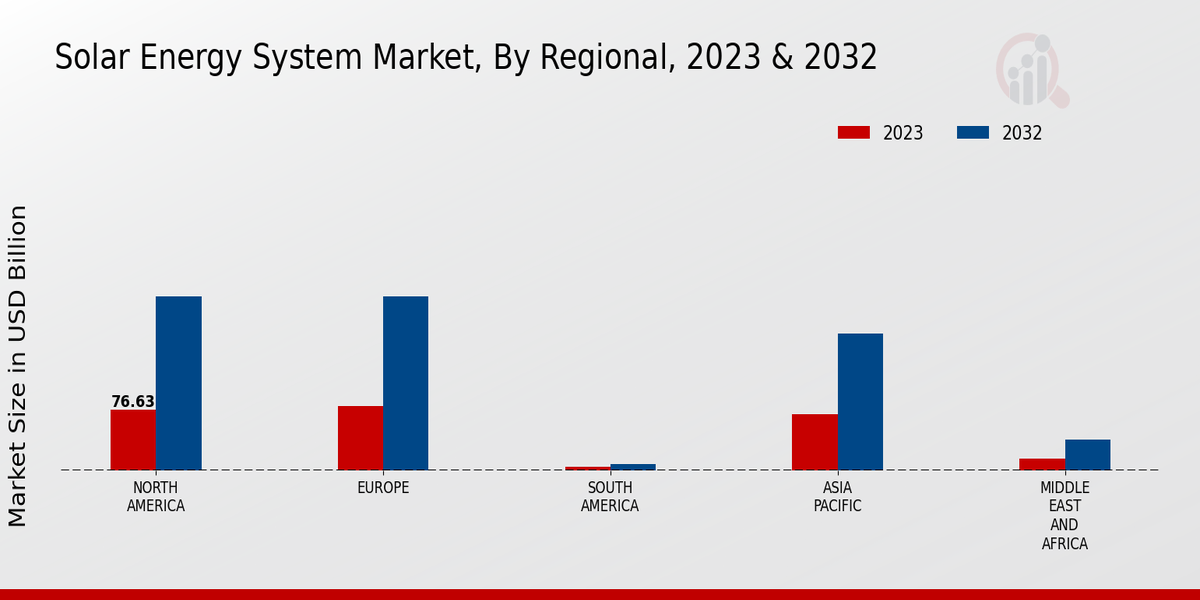Rising Energy Costs
The increasing cost of traditional energy sources is driving consumers and businesses to seek alternative energy solutions, thereby propelling the Global Solar Energy System Market Industry. As fossil fuel prices fluctuate and environmental concerns rise, solar energy emerges as a viable and cost-effective option. The long-term savings associated with solar energy systems, coupled with decreasing installation costs, make them an attractive investment. This shift in consumer behavior is likely to contribute to the market's growth, as more individuals and organizations recognize the financial and environmental benefits of solar energy.
Market Growth Projections
The Global Solar Energy System Market Industry is projected to experience robust growth, with estimates indicating a market value of 274.1 USD Billion in 2024 and a staggering 912.9 USD Billion by 2035. This growth trajectory suggests a compound annual growth rate (CAGR) of 11.56% from 2025 to 2035, reflecting the increasing adoption of solar energy across various sectors. The expansion is likely fueled by technological advancements, supportive government policies, and rising consumer demand for renewable energy solutions. These projections underscore the potential of the solar energy market to transform the global energy landscape.
Technological Advancements
Technological innovations play a crucial role in the expansion of the Global Solar Energy System Market Industry. The development of more efficient solar panels and energy storage systems has significantly enhanced the performance and reliability of solar energy systems. For instance, the introduction of bifacial solar panels, which capture sunlight from both sides, has improved energy generation efficiency. These advancements not only reduce the cost of solar energy but also increase its competitiveness against traditional energy sources. Consequently, the market is expected to grow substantially, with a projected CAGR of 11.56% from 2025 to 2035.
Global Energy Security Concerns
Concerns over energy security are influencing the Global Solar Energy System Market Industry. As geopolitical tensions and supply chain vulnerabilities threaten the stability of traditional energy supplies, countries are increasingly turning to renewable energy sources like solar power. By investing in solar energy, nations can reduce their dependence on imported fossil fuels and enhance their energy independence. This strategic shift not only supports national security objectives but also aligns with global efforts to combat climate change. The growing emphasis on energy security is expected to drive significant investments in solar energy systems in the coming years.
Government Policies and Incentives
Government policies and incentives are pivotal in shaping the Global Solar Energy System Market Industry. Many countries are implementing favorable regulations, tax credits, and subsidies to encourage the adoption of solar energy. For example, the U.S. federal solar tax credit allows homeowners and businesses to deduct a significant percentage of the cost of solar installations from their federal taxes. Such initiatives not only lower the financial barriers to entry for solar energy but also stimulate market growth. As a result, the industry is poised for expansion, with the market expected to reach 912.9 USD Billion by 2035.
Growing Demand for Renewable Energy
The Global Solar Energy System Market Industry is experiencing a surge in demand for renewable energy sources, driven by increasing awareness of climate change and the need for sustainable energy solutions. Governments worldwide are implementing policies and incentives to promote solar energy adoption, which is reflected in the projected market value of 274.1 USD Billion in 2024. This growing demand is further supported by advancements in solar technology, making solar energy more accessible and cost-effective for consumers and businesses alike. As a result, the industry is likely to witness substantial growth in the coming years.



























Leave a Comment